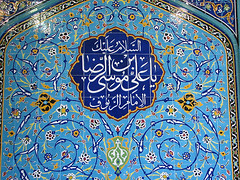Sunday, December 09, 2007
Lawrence of Arabia exam review
Lawrence of Arabia Quiz / SW Asia / Trudeau
1. Lawrence was from a) Cambridge b) London c) Edinburgh d) Stratford e) Oxford.
2. Prior to WWI he had studied English, French and __. a) Hebrew b) Arabic c) German d) Persian/Farsi e) Amharic f) Egyptian.
3. The dates of WWI: a) 1911 - 1921 b) 1911 - 1914 c) 1914 - 1918 d) 1914 - 1921.
4. On the German side in WWI: a) Japan b) Turkey c) Saudi Arabia d) Persia.
5. On the English side in WWI: a) Germany b) Bulgaria c) Russia d) Austria-Hungary e) Turkey.
6. The Ottoman Empire was synonymous with (another name for ...) the a) Arabs
b) Turks c) Persians d) Germans.
7. The Arabic word for a dry canyon bed - typically a place where settlements were built: a) hazimi b) in sh’allah c) wadi d) jebel.
8. The Islamic golden age, a time of expansion and cultural achievements, occurred a) before 600 CE b) after 600 c) after 600 BCE.
9. A high priority item for the British in WWI: a) oil b) artillery c) Aqaba d) Suez Canal.
10. Ululation is an activity chiefly controlled by a) men b) women c) imams d) sheiks.
11. “The law says the man must die.” This is based on a code associated with a historic leader of Mesopotamia. a. Cyrus b. Hammurabi c) Darius.
12. The term ‘wog’ refers unenthusiastically to ... a) Arab b) camel c) Jew d) Turk.
13. Sherif Ali, a nobleman and military leader under King Feisel, has 2 African bodyguards. Explain: a) It is a realistic note, given the history of Arabs incursions into West Africa. b) It is a gross exaggeration based on a traditional stereotype in regards slavery.
14. In 1918 the British officers and some troops knew of the success of Lawrence’s fight alongside Arab forces. The Turks knew who he was, and put a bounty on his head, but didn’t know what he looked like. But by 1920 everyone in England knew of the brave deeds of Lawrence. What happened? a) the popularity of Lawrence’s book, The Seven Pillars of Wisdom. b) Lawrence began to give lectures across England on what happened to the Arab cause in WWI. c) Lowell Thomas gave lectures across England on Lawrence’s role in the Middle East.
15. The Sykes-Picot Treaty is an agreement at the end of WWI that proclaims that 2 nations will divide the control of the Middle East. Which European nations took over the defeated Turkish Empire? a) Britain & Germany b) Britain & Belgium c) Britain & France d) Britain & Italy e) Britain & Denmark f) Britain & Libya.
16. Arabs felt the most important Islamic, Arabic city in the WWI era was
a) Cairo b) Jerusalem c) Beirut d) Aqaba e) Damascus.
17. In the WWI era in England we hear references to the guinea and the shilling. They are items of a) military status b) native peoples’ food c) art d) currency
e) the law.
18. One of the early challenges for Lawrence and the Arab troops was the crossing of the a) Nefud desert b) Sinai c) Red Sea d) Suez Canal e) Gulf of Aqaba.
19. Nomadic Arab peoples are known ethnically as the a) Hazimi
b) Hashemites c) Semites d) Bedouins e) Wadi.
20. The sin committed by a man who claims to have performed a miracle: a) adultery b) blasphemy c) gluttony d) envy e) lust.
21. Salaam aleikum! translated: a) “Peace be with you.” b) “There is no God but Allah and Muhammad is his prophet.” c) “Prayer is better than sleep.”
22. In explaining to Feisel the reason for Britain’s power, the British officer puts an emphasis on ... a) technology b) discipline c) skill d) wealth.
23. Lawrence’s WWI journey went from Oxford to Damascus. Choose the item below which has the correct order of locations for Lawrence and the Arab Revolt:
a) Cairo, Aqaba, Jerusalem, Damascus b) Aqaba, Jerusalem, Cairo, Oxford
c) Aqaba, Yenbo, Jerusalem, Damascus d) Yenbo, Cairo, Aqaba, Jerusalem, London.
24. In the desert, Lawrence sings a WWI-era ditty about a man in a casino. The gambler won big money in the tiny country of a) Monte Carlo b) Vatican City
c) Andorra d) Monaco.
25. In an accord signed in Switzerland, the big nations have set guidelines for the treatment of prisoners of war: a) Treaty of Versailles b) London Accord
c) Zurich Agreement d) Geneva Convention.
26. Between the Black Sea and the Caspian lies a region kown to the Turks as home to the Circassians. The region is named for a mountain range, the __ .
a) Caucasus b) Appennines c) Hejaz d) Yemeni.
27. Soldier for hire: a) Supaman b) Bedouin c) Jihadi d) mercenary.
28. Irreverence toward something considered sacred is called a) brigand
b) bedouin c) mercenary d) blasphemous.
29. In Arabia you can find a date at a place called a a) coffee shop b) tavern
c) cabaret d) oasis e) wadi.
30. In WWI the British attacked the Turkish-held Mid East and drove the Turks from the holy city of __. a) Damascus b) Aqaba c) Jerusalem d) Mecca.
answers ...
1. e) Oxford
2. b) Arabic
3. c) 1914 - 1918
4. b) Turkey c) Russia
5. b) Turks
6. c) wadi
7. b) after 600 AD
8. d) Suez Canal
9. b) women
10. b) Hammurabi
11. a) Arab
12. a) realistic
13. c) American reporter
14. c) Br. & Fr.
15. e) Damascus
16. d) currency
17. a) Nefud
18. d) Bedouins
19. b) blasphemy
20. a) “Peace be w/ u”
21. b) discipline
Subscribe to:
Post Comments (Atom)


No comments:
Post a Comment